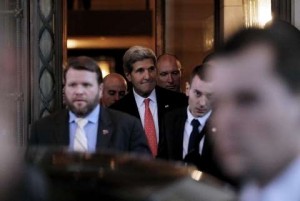 Had the foreign ministers of the seven countries involved in the negotiations over Iran�s nuclear program remained at home, the last round that were held in Geneva would have been presented as a success. At the end of that session, the two lead negotiators � Catherine Ashton for the five permanent members of the Security Council plus Germany (P5+1), and Abbas Araqchi for Iran � would have issued a joint communiqu� expressing their satisfaction with the important progress achieved and their hope to reach, with some more hard work, a complete agreement in one or two more meetings.
Had the foreign ministers of the seven countries involved in the negotiations over Iran�s nuclear program remained at home, the last round that were held in Geneva would have been presented as a success. At the end of that session, the two lead negotiators � Catherine Ashton for the five permanent members of the Security Council plus Germany (P5+1), and Abbas Araqchi for Iran � would have issued a joint communiqu� expressing their satisfaction with the important progress achieved and their hope to reach, with some more hard work, a complete agreement in one or two more meetings.Ministers don�t usually join a complex negotiating process unless the agreement under discussion is all but finalized. One or two points of contention can be left to their discretion if they correspond to their level of responsibility, which is political, certainly not technical. This was not the case in Geneva�s last meeting. Mohammad Javad Zarif, the Iranian Foreign Minister, was already there from the outset. One day later, the US Secretary of State John Kerry abruptly modified his Middle East agenda so he could rush to Geneva. But, at that time, the text of the draft agreement still bore square brackets around language touching upon crucial points.
Why, then, was such a decision made? Perhaps it was Kerry�s initiative, or that of Catherine Ashton, or maybe it was the U.S. team in Geneva � or both � who told Mr. Kerry to come since the agreement was close to completion. (In any case, somewhere along the way there was a wrong assessment of the situation, and probably some dose of over-confidence in the American capacity to wrap up an agreement.) In still another hypothesis, perhaps the draft was practically finalized, thus authorizing the arrival of the ministers for signature, but the French unexpectedly reneged on their initial consent. This would have represented a grave breach of rules on France�s part. Until now, no evidence has confirmed such a scenario.
From then on, things could only go from bad to worse. The mere announcement of Kerry�s arrival created a wave of unfounded optimism. Informed of Kerry�s decision, the European ministers felt an obligation to come to Geneva, if only to be part of the game. Pressed by a crowd of journalists, the ministers could not keep silent for long. Most of them confined themselves to general, upbeat statements. But Laurent Fabius went the opposite way. His breaking of the rule of confidentiality and his visible annoyance at the turn of events made him, and France with him, the lightning rod, attracting all the frustrations created by the widening gap between high expectations and the practical hurdles of the negotiation process. And nothing could be changed by the last-minute arrival of the Russian and Chinese ministers. That session was already doomed.
If there was a mistake on Fabius� side, it was to corner himself in the role of the bad cop. Of course, he could have also made a deliberate choice in favor of French interests in Israel and in the Arabian Peninsula; history will tell. But if it was indeed a matter of commercial interest, France should have positioned itself as the best friend of Iran � where 75 million consumers crave western goods and equipment � and appealed for an early lifting of sanctions. Indeed, Iran is a country where France could almost instantly sell at least one or two nuclear power plants, two or three dozen Airbuses, resume production of hundreds of thousands cars, regain the exploitation of major oil and gas fields, and even substantially upgrade a widely obsolete system of defense.
Coming back to diplomacy, in previous times, when officials empowered by their respective governments had reached an agreement on a common draft, they used to initial the text. This meant that the negotiation was closed. It was then up to the governments to approve or reject the document as it was. If all governments agreed on the text, it could be signed at the political level, usually through a meeting of foreign ministers. This was of course before cell phones, and government airliners that now enable ministers to rush instantly to any corner of the planet. But the participants to the current negotiations would be well advised to keep in mind at least the spirit of such time-proven procedures. This could indeed be useful for the rough ride still ahead of them, as the next round of talks will need to bypass several more difficult and tense stages beyond the first agreement, which will hopefully be signed soon.
By Lobe Log
The Iran Project is not responsible for the content of quoted articles.










